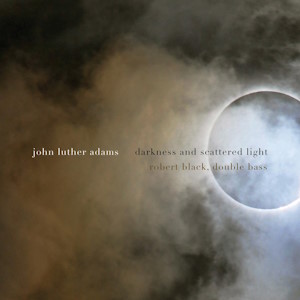
John Luther Adams (b.1953)
Darkness and Scattered Light
Three High Places (version for double bass) (2007)
Darkness and Scattered Light (for five double basses) (2023)
Three Nocturnes (2022)
Robert Black (double bass)
rec. 2023, Firehouse 12, New Haven, USA
Cold Blue Music CB0067 [45]
Perhaps it’s a sign of the times but fresh from reviewing an album of the music of Žibuoklė Martinaitytė where, instead of her customary light filled landscapes, the piece recorded plumbed the darkest abyss of the oceans, I now find myself reviewing an album where John Luther Adams explores the sepulchral depths of darkness via the sound of the double bass. As a most passionate environmentalist, I am sure JLA would say that it is most appropriate music for dark times given the summer we have just had. He prefaces his brief notes on the pieces on this album with a quotation from John Haines which reads: “to the sun that has set, whose dawn I cannot see…”
Whilst seldom a difficult listen, John Luther Adams has always been an uncompromising composer whose music has been pared down to bare essentials by his time virtually living off grid in Alaska. It is rather like some kind of natural element such as a rock or tree polished by the action upon it of wind and weather. Oddly, that ascetic sensibility is deeply consoling in such dark music like being guided through forbidding terrain by a wise but gruff old hand. If the state of the environment threatens us now with tribulations to come, JLA is not the kind of man to shy away from looking them straight in the eye.
Not that the album starts in darkness. Even in its arrangement for double bass, 2007’s High Places shimmers with the light of natural harmonics. As a piece that features only open strings and such harmonics, this arrangement required Black to retune his bass to perfect fifths. Typically of his style, JLA exploits the natural acoustic qualities of the instrument.
The Three Nocturnes with which the disc concludes form a pair with High Places, the earlier piece concerned with light, the later one darkness. In this case, light becomes associated with the resonances and harmonics of perfect fifths, darkness with the traditional tuning of a double bass in in perfect fourths. A very simple idea but strikingly effective in practice and one that finds echoes with the history of fifths and fourths in the story of western classical music, the former the building blocks of tonality, the latter associated with more troublesome, disturbing qualities.
The piece Darkness and Scattered Light which gives its name to the whole collection, was written for five double basses with Robert Black overdubbing all the parts himself. It describes a long, slow arc from midnight to midday back to midnight again with night associated with what the composer terms “minor sounding intervals” and day the “major sounding” ones. Its calm rocking rhythms give the work a scale that seems greater and grander than its relatively brief 16 minute duration. It seems more concerned with time as an experience than its measurement by a clock. As with the other works on this disc, its direct and simple confrontation with its subject matter has a similar effect to contemplating the nature it is inspired by.
Whilst not the obvious place for the novice to start, this is another important and satisfying addition to the JLA discography. Performances and recording show the dedication that his music tends to produce in performers. Those who, like me, rate John Luther Adams as one of the finest composers writing today need not hesitate.
David McDade
Help us financially by purchasing from




















